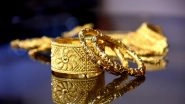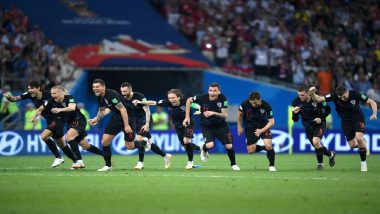Belgrade, Jul 13: Croatia's neighbours in the former Yugoslavia have largely praised the team's surprise success in reaching the World Cup final in Russia -- just don't expect the Serbian president to support them, at least for now.
Every time a major tournament comes around, a familiar refrain is heard in the region: "If only Yugoslavia was one country, imagine the amazing team we could have."
That nostalgic lament hides the fact that Croatia are doing just fine without Bosnian or Serb players -- and Yugoslavia, after all, never reached a World Cup final.
If one man embodies football and the dream of a multi-cultural Yugoslavia, it is Ivica Osim, the coach of the last Yugoslavia team before the country violently broke apart.
He was in charge of a superb team at the 1990 World Cup in Italy that was knocked out at the quarter-final stage in a penalty shootout by Diego Maradona's Argentina.
When Serb forces began bombing the city, Osim, barely holding back the tears, told Serb journalists that he hoped they would remember "that I come from Sarajevo".
Now 77, the Bosnian has watched Croatia and midfield maestro Luka Modric's run to Sunday's final against France with huge admiration.
"They have managed to integrate their individual qualities into the collective" and never give up even when they are exhausted, he told the Jutarnji List newspaper, adding that "this is not a common trait with us".
In a region still scarred by the conflicts of the 1990s in which 130,000 people died, many people find it hard to throw their support behind Croatia despite a common language and culture. That is especially the case in Serbia, whose team failed to qualify for the knock-out stages of the World Cup.
In early June, a mini-World Cup was organised for children attending football schools in Belgrade. Each team wore the colours of one of the 32 qualified teams -- except the team representing Croatia. To avoid offending any Serbian sensitivities, the children in that team had to wear blank white t-shirts.
Novak Djokovic is Serbia's best-known sportsman and an idol in his country, but when the 12-time Grand Slam winner voiced support for the Croatia World Cup team, he was condemned by Vladimir Djukanovic, a lawmaker from the ruling Serbian Progressive Party.
"Only idiots can support Croatia. Aren't you ashamed Novak?" Djukanovic tweeted. His argument was that Djokovic has wide support from Serbs in Krajina, a region of Croatia where Serbs were in the majority before they were driven out during the war. Serbian President Aleksandar Vucic made no secret of which team he backed in Croatia's World Cup quarter-final against host nation Russia.
"I supported Russia, that is my right. Serbia is a democratic society and everyone has the right to support whoever they want," Vucic said.
'Well done neighbours!'
That opinion is by no means shared by everyone. Many Serbs have expressed admiration, and sometimes even outright joy, at Croatia's success. "Congratulations with all my heart, bravo!", Miodrag, a resident of Nis in southern Serbia told the website of Serbian state TV on Wednesday after the semi-final win over England.
"Our players and the (Serbian) federation could maybe ask the Croats to give us football lessons," someone else commented. Milojko Pantic, a well-known sports commentator when Yugoslavia was still a single country, said that Serbs with a sense of brotherliness had supported Croatia in the quarter-finals while those who wanted to see Russia beat Croatia were "bigots and nationalists".
In Macedonia, most residents are supporting Croatia, despite the nationalist right's unswerving support for Russia. "Congratulations Croatia. Politics, sport, the region and the world have all come together tonight," Macedonian Prime Minister Zoran Zaev tweeted along with a photo of himself and Croatian President Kolinda Grabar-Kitarovic at a NATO summit.
"Politics aside, hats off to you, neighbours! You are the pride of the former Yugoslavia," said an unnamed Montenegro on the website of the Vijesti newspaper. Around 6,000 Croats live in Montenegro.
Croats in Bosnia, where they make up 15 percent of the population, also supported the Croatia team, but Bosnian political analyst Zoran Kresic detected something deeper, saying the support "has unified the region and Bosnia for the first time since the bloody wars". He saw it as part of a "gradual warming of relations" between Croats, Bosnians and Serbs.
(The above story is verified and authored by Press Trust of India (PTI) staff. PTI, India’s premier news agency, employs more than 400 journalists and 500 stringers to cover almost every district and small town in India.. The views appearing in the above post do not reflect the opinions of LatestLY)













 Quickly
Quickly


